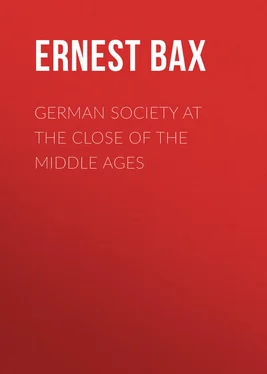Ernest Bax - German Society at the Close of the Middle Ages
Здесь есть возможность читать онлайн «Ernest Bax - German Society at the Close of the Middle Ages» — ознакомительный отрывок электронной книги совершенно бесплатно, а после прочтения отрывка купить полную версию. В некоторых случаях можно слушать аудио, скачать через торрент в формате fb2 и присутствует краткое содержание. Жанр: foreign_antique, foreign_prose, на английском языке. Описание произведения, (предисловие) а так же отзывы посетителей доступны на портале библиотеки ЛибКат.
- Название:German Society at the Close of the Middle Ages
- Автор:
- Жанр:
- Год:неизвестен
- ISBN:нет данных
- Рейтинг книги:5 / 5. Голосов: 1
-
Избранное:Добавить в избранное
- Отзывы:
-
Ваша оценка:
- 100
- 1
- 2
- 3
- 4
- 5
German Society at the Close of the Middle Ages: краткое содержание, описание и аннотация
Предлагаем к чтению аннотацию, описание, краткое содержание или предисловие (зависит от того, что написал сам автор книги «German Society at the Close of the Middle Ages»). Если вы не нашли необходимую информацию о книге — напишите в комментариях, мы постараемся отыскать её.
German Society at the Close of the Middle Ages — читать онлайн ознакомительный отрывок
Ниже представлен текст книги, разбитый по страницам. Система сохранения места последней прочитанной страницы, позволяет с удобством читать онлайн бесплатно книгу «German Society at the Close of the Middle Ages», без необходимости каждый раз заново искать на чём Вы остановились. Поставьте закладку, и сможете в любой момент перейти на страницу, на которой закончили чтение.
Интервал:
Закладка:
CHAPTER I.
FIRST SIGNS OF SOCIAL AND RELIGIOUS REVOLT
The echoes of the Hussite movement in Bohemia spread far and wide through Central Europe at the beginning of the fifteenth century. It was not in vain that Ziska bequeathed his skin for the purposes of a drum, since the echoes of its beating made themselves heard for many a year in Bohemia and throughout Central Europe. The disciples of the movement settled in different countries, and became centres of propaganda, and the movement attached itself to the peasants' discontent. Amid the various stirrings that took place, there are one or two that may arrest our attention owing to their importance and their typical character.
It was in the year 1476, when Rudolph of Scherenberg occupied the Episcopal See of Würzburg, that a cowherd, named Hans Boheim, of the neighbouring village of Niklashausen, who was accustomed to pipe and to drum at local festivities, at places on the banks of the little stream called the Tauber, was suddenly seized with an inspiration of preaching for the conversion of his neighbours from their sins. It appeared to him that his life had been hitherto sinful; he gave up all participation in village feasts, he became a dreamer, and announced that he had had visions of the Virgin. In the middle of Lent he proclaimed that he had been given a divine mission from the Mother of God herself to burn his pipe and drum and to devote himself entirely to preaching the Gospel to the common man. All were to abandon their former way of life, were to lay aside all personal ornament, and in humble attire to perform pilgrimages to Niklashausen, and there worship the Virgin as they esteemed their souls' salvation. In all this there was nothing very alarming to the authorities. Peasantly inspirations were by no means unknown in the Middle Ages; but the matter assumed another aspect when the new seer, Hans Pfeifferlein, or "the little piper" as he was nicknamed, announced that the Queen of Heaven had revealed to him that there should henceforth be neither Emperor, Pope, Prince, nor any lay or spiritual authority; but that all men should be brothers, earning their bread by the sweat of their brows, and sharing alike in all things. There were to be no more imposts or dues; land, woods, pastures, and water were to be free. The new Gospel struck root immediately. The peasant folk streamed to Niklashausen, from all sides, – men and women, young and old, journeymen, lads from the plough, girls from the fields, their sickles in their hands, without leave of lord or master, and without preparation of any sort whatever. Food and the necessary clothing and shelter were given them by those on the way who had already embraced the new Kingdom of God. The universal greeting among the pilgrims was "brother" and "sister".
This went on for some months, the young prophet choosing chiefly Sundays and holidays for his harangues. Ignorant even of writing, he was backed by the priest of Niklashausen, and by perhaps two or three other influential persons. Many were the offerings brought to the Niklashausen shrine. Well nigh all who journeyed thither left some token behind, were it only a rough peasant's cap or a wax candle. Those who could afford it gave costly clothes and jewellery. The proclamation of universal equality was indeed a Gospel that appealed to the common man; the resumption of their old rights, the release from every form of oppression, as a proclamation from heaven itself, were tidings to him of great joy. The prophetic youth was hailed by all as the new Messiah. After each week's sermon he invited the congregation to return next week with redoubled numbers; and his commands were invariably obeyed. Men, women and children fell on their knees before him, crying: "Oh, man of God, sent from heaven, have mercy on us and pity us". They tore the wool threads from his shaggy sheepskin cap, regarding them as sacred relics. The priests of the surrounding districts averred that he was a sorcerer and devil-possessed, and that a wizard had appeared to him, clad in white, in the form of the Virgin, and had instilled into him the pernicious doctrines he was preaching. In all the surrounding country his miracles were talked about. The Bishops of Mainz and Würzburg and the Council of Nürnberg forbade their villeins, under heavy penalties, from making the pilgrimage to Niklashausen. But the effect of such measures only lasted for a short time.
Finally, on the Sunday before the day of Saint Kilian, Hans Boheim, on the conclusion of his discourse, invited his hearers, as usual, to come on the next occasion. This time, however, he ordered men only to appear, but with arms and ammunition; women and children were to be left at home. No sooner did the tidings of this turn of affairs reach the ears of the Bishop at Würzburg than the latter resolved to forestall the movement. He sent thirty-four mounted men-at-arms after nightfall to Niklashausen; they burst upon the sleeping youth, tore him from the house where he lay, and hurried him to Würzburg, bound on horseback. But as it was near the end of the week, 4000 pilgrims had already arrived at Niklashausen, and, on hearing the news of the attack, they hurried after the marauders, and caught them up close by the Castle of Würzburg. One of the knights was wounded, but his comrades succeeded in carrying him within the walls. The peasants failed to effect the intended rescue. By the Sunday, 34,000 peasants had assembled at Niklashausen; but the report of the capture of Boheim had a depressing effect, and several thousands returned home. There were nevertheless some among the bands who, instigated probably by Boheim's friend, the parish priest of Niklashausen, endeavoured to rally the remaining multitude and incite them to a new attempt at rescue. One of them alleged that the Holy Trinity had appeared to him, and commanded that they should proceed with their pilgrim candles in their hands to the Castle of Würzburg, that the doors would open of themselves, and that their prophet would walk out to greet them. About 16,000 followed these leaders, marching many hours through the night, and arriving early next morning at the castle with flaming candles, and armed with the roughest weapons. Kunz von Thunfeld, a decayed knight, and Michael, his son, constituted themselves the leaders of the motley band. The marshal of the castle received them, demanding their pleasure. "We require the holy youth," said the peasants. "Surrender him to us, and all will be well; refuse, and we will use force." On the marshal's hesitating in his answer, he was greeted with a shower of stones, which drove him to seek safety within the walls. The bishop opened fire on the peasants, but after a short time sent one of his knights to announce that the cause of their preacher would be duly considered at a proper time and place, conjuring them at the same time to depart immediately in accordance with their vows. By cajolery and threats he succeeded in his object; the bands raised the siege of the castle, and dispersed homewards in straggling parties. The ruffianly scoundrel no sooner observed that the unsuspecting peasants were quietly wending their way home in small bodies, without a thought of hostilities, than he ordered his knights to pursue them, to attack them in the rear, and to murder or capture the ringleaders. The poor people, nevertheless, defended themselves with courage against this cowardly onslaught; twelve of them were left dead on the spot; many of the remainder sought shelter in the church of the neighbouring village. Threatened there with fire and sword, they surrendered, and were brought back to Würzburg and thrown into the dungeons of the castle. The majority were liberated before long; but the peasant who was alleged to have received the vision of the Holy Trinity, as well as he who had wounded the knight on the occasion of the attempt at rescue a few days before, were detained in prison, and on the following Friday were beheaded outside the castle. Hans Boheim was at the same time burned to ashes. The leader of the revolt, Kunz von Thunfeld, a feudatory of the bishop, fled the territory, and was only allowed to return on his formally surrendering his lands in perpetuity to the bishopric. Such was the history of a movement that may be reckoned as one of the more direct forerunners of the peasants' war.
Читать дальшеИнтервал:
Закладка:
Похожие книги на «German Society at the Close of the Middle Ages»
Представляем Вашему вниманию похожие книги на «German Society at the Close of the Middle Ages» списком для выбора. Мы отобрали схожую по названию и смыслу литературу в надежде предоставить читателям больше вариантов отыскать новые, интересные, ещё непрочитанные произведения.
Обсуждение, отзывы о книге «German Society at the Close of the Middle Ages» и просто собственные мнения читателей. Оставьте ваши комментарии, напишите, что Вы думаете о произведении, его смысле или главных героях. Укажите что конкретно понравилось, а что нет, и почему Вы так считаете.










